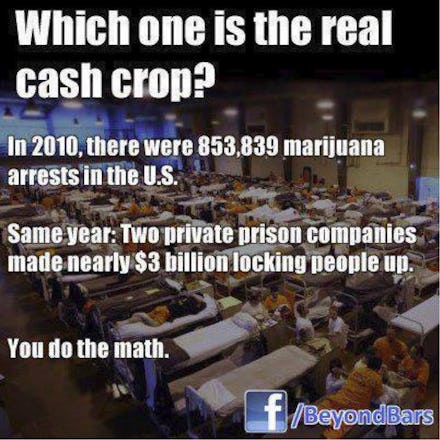One Meme Sums Up How Absurd America's War on Drugs Has Become

The news: As this graphic from Beyond Bars highlights, America's war on marijuana — and the war on drugs more generally — is leading to countless numbers of Americans being rounded up and sent into an overcrowded prison system. In many cases, they're even being sent to serve their time in a private prison industry that's making huge profits off tough-on-crime policies and lenghty sentences. Some even lobby for longer sentences and implementing jail time for more and more offenses, knowing this will swell their enrollment and revenue.
The background: In 2010, two private prison companies alone did indeed take in close to $3 billion in revenue, while their top executives each received annual compensation worth "well over" $3 million. During that same year, marijuana prosecutions were at nearly the highest they'd ever been, nearly identical to the number reported in 2009 — 853,838 people were arrested for marijuana-related offenses, or about 52% of all drug crimes.
Private prisons are big business, holding 128,195 of 1.6 million prisoners in December 2010. It's a growth industry that boomed 37% between 2002 and 2009. Industry leader Corrections Corporations of America has seen its profits increase by 500% in the past 20 years. When private prisons set up shop in states, they sign contracts obliging state authorities to provide occupancy rates ranging from 80% to 100% or pay for the empty beds. They have political allies; the three largest private prison corporations have spent about $45 million lobbying at the state and federal level in the decade preceding 2012.
There's no reason for private prisons other than overcrowding, which has almost entirely been driven by the war on drugs. They mostly exist because local, state and federal authorities can't afford to build enough new prisons. A 2014 review by the Congressional Research Service found that while private prisons were useful for managing overcrowding, they don't necessarily offer cost benefits to taxpayers or increased services for their inmates.
The private prison system is rife with alleged corruption and ethical quandaries. In Louisiana, the world's prison capital, police lock up offenders en masse in private prisons in which local sheriffs and politicians often have financial stakes. Private prisons handled nearly half of the beds in America's civil detention facilities in 2011, eager to process some of the 400,000 immigrants detained annually. (Private prisons were in favor of Arizona's incredibly controversial SB 1070, which aimed to arrest, process and deport undocumented immigrants.) And they have a huge stake in the drug war, citing "any changes with respect to drugs and controlled substances" and any "changes that could lower minimum sentences for some nonviolent crimes and make more inmates eligible for early release based on good behavior" as risks in their 2010 report.
Many of the new arrests that led to overflowing prisons and a burgeoning private prison sector have been for simple drug possession, including a disportionate amount of simple marijuana possession arrests. As DrugWarFacts concludes using the FBI's Uniform Crime Reports:
Although the intent of a 'War on Drugs' may have been to target drug smugglers and 'King Pins,' according to the FBI's annual Uniform Crime Reports, of the 1,552,432 arrests for drug law violations in 2012, 82.2% (1,276,099) were for mere possession of a controlled substance. Only 17.8% (276,333) were for the sale or manufacturing of a drug. Further, nearly half (48.3%) of drug arrests in 2012 were for marijuana -- a total of 749,825. Of those, an estimated 658,231 arrests (42.4% of all drug arrests) were for marijuana possession alone. By contrast in 2000, a total of 734,497 Americans were arrested for marijuana offenses, of which 646,042 (40.9%) were for possession alone.
Why you should care: At a time when multiple states have legalized marijuana and 58% of Americans support legalized weed, both continuing to lock people up in an overcrowded prison system for minor drug offenses and allowing corporations to profit from human confinement are terrible, short-sighted paths we continues to head down. This system makes no sense and should be replaced by one that decriminalizes low-level drug possession and sends drug users to rehab, not jail.